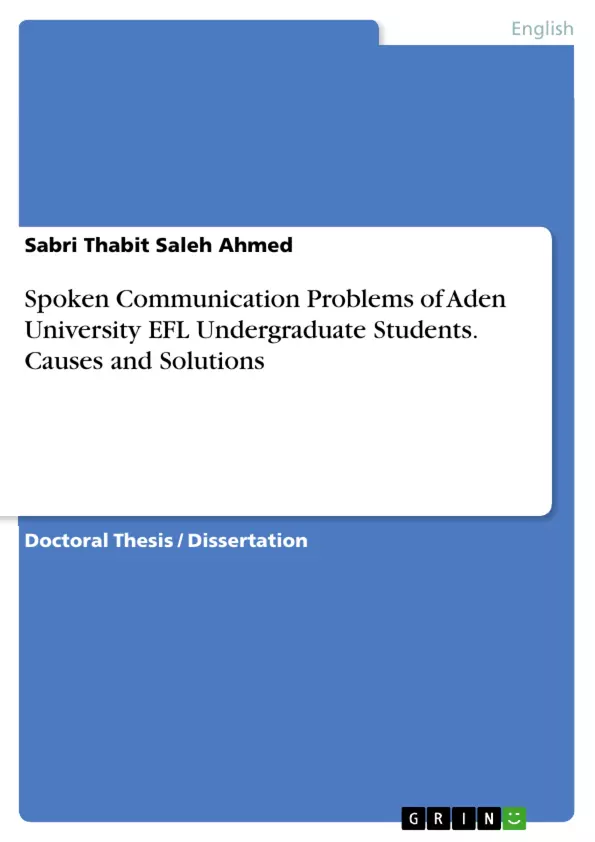This study was designed to investigate the spoken communication difficulties encountered by the fourth year EFL (English as a foreign language) students of some rural faculties of Aden University and the factors that might negatively contribute to their poor acquisition of spoken communication proficiency during their learning of English in these faculties. The goal is to reach some suggestions and solutions that may help in changing the current situation and enabling the concerned EFL programs to produce proficient speakers of English. The data were collected through varied instruments, namely students’ questionnaire (n = 120), teachers’ questionnaire (n = 23), students’ interviews (n = 30), speaking skill teachers’ interviews (n = 4), students’ spoken communication proficiency assessment rubric (n = 42), classroom observations (n = 6), and an assessment of speaking skill syllabi. The collected data were analyzed by using the SPSS 21st version and manually. The results revealed that the majority of students encounter fluency and automaticity related difficulties and lack of communication strategies. Moreover, some students also share one or more difficulties with these two major ones, such as phonological difficulties, comprehension difficulties, sociocultural difficulties, lack of discourse knowledge, affective difficulties, and lexical and grammatical difficulties, respectively. Though most students seem to have mastered a somehow sufficient level of grammar and vocabulary, many of them cannot put their lexical and grammatical knowledge into use orally.
Table of Contents
- Introduction
- Literature Review
- Spoken Communication
- Problems of EFL Learners
- Causes of Spoken Communication Problems
- Solutions for Spoken Communication Problems
- Research Methodology
- Research Design
- Population and Sample
- Data Collection Instruments
- Data Analysis Procedure
- Results and Discussion
- Results of the Questionnaire
- Results of the Interview
- Discussion of the Findings
- Conclusions and Recommendations
Objectives and Key Themes
This research aims to investigate the spoken communication problems experienced by EFL undergraduate students at Aden University in Yemen. The study delves into the specific causes of these challenges and explores potential solutions to enhance their spoken communication abilities.
- The challenges faced by EFL students in spoken communication.
- The underlying causes of these communication problems.
- Effective strategies and approaches to address these challenges.
- The impact of cultural and linguistic factors on spoken communication.
- The role of education and training in improving spoken communication skills.
Chapter Summaries
- Introduction: This chapter introduces the research topic, highlighting the significance of spoken communication skills for EFL students. It outlines the research objectives and the research questions guiding the study. The chapter also provides a brief overview of the study's scope and limitations.
- Literature Review: This chapter explores existing research on spoken communication, focusing on the challenges faced by EFL learners. It reviews different theories and frameworks related to spoken communication, language acquisition, and EFL pedagogy. The chapter also examines various causes of spoken communication problems and presents a comprehensive overview of proposed solutions.
- Research Methodology: This chapter describes the research design, population and sample, data collection methods, and data analysis techniques used in the study. It details the questionnaires and interviews employed to gather data from EFL students and their teachers. The chapter explains the procedures for analyzing the collected data.
- Results and Discussion: This chapter presents the findings of the study based on the analysis of collected data. It discusses the patterns and trends observed in the questionnaire and interview responses, shedding light on the specific spoken communication problems encountered by EFL students at Aden University. The chapter analyzes the contributing factors to these problems and examines the implications of the results for EFL teaching and learning.
Keywords
The research focuses on spoken communication problems, EFL students, Aden University, causes of communication difficulties, solutions for improving spoken communication, language acquisition, EFL pedagogy, research methodology, data analysis, qualitative and quantitative research.
Frequently Asked Questions
What are the main causes of spoken communication problems for EFL students?
Key causes include a lack of fluency and automaticity, phonological difficulties, sociocultural factors, and a lack of discourse knowledge.
Can students with good grammar still struggle with speaking?
Yes, the study shows that many students master grammar and vocabulary but cannot put this knowledge into use orally due to affective or lexical difficulties.
What role does culture play in English language acquisition?
Sociocultural difficulties and a lack of exposure to native-like communication contexts can negatively impact a student's spoken proficiency.
How can EFL programs improve students' speaking skills?
Suggestions include revising syllabi, incorporating more interactive communication strategies, and focusing on automaticity in classroom activities.
What are "affective difficulties" in language learning?
These refer to emotional factors like anxiety, lack of confidence, or fear of making mistakes that hinder oral performance.
- Citar trabajo
- Dr. Sabri Thabit Saleh Ahmed (Autor), 2021, Spoken Communication Problems of Aden University EFL Undergraduate Students. Causes and Solutions, Múnich, GRIN Verlag, https://www.grin.com/document/1319197



